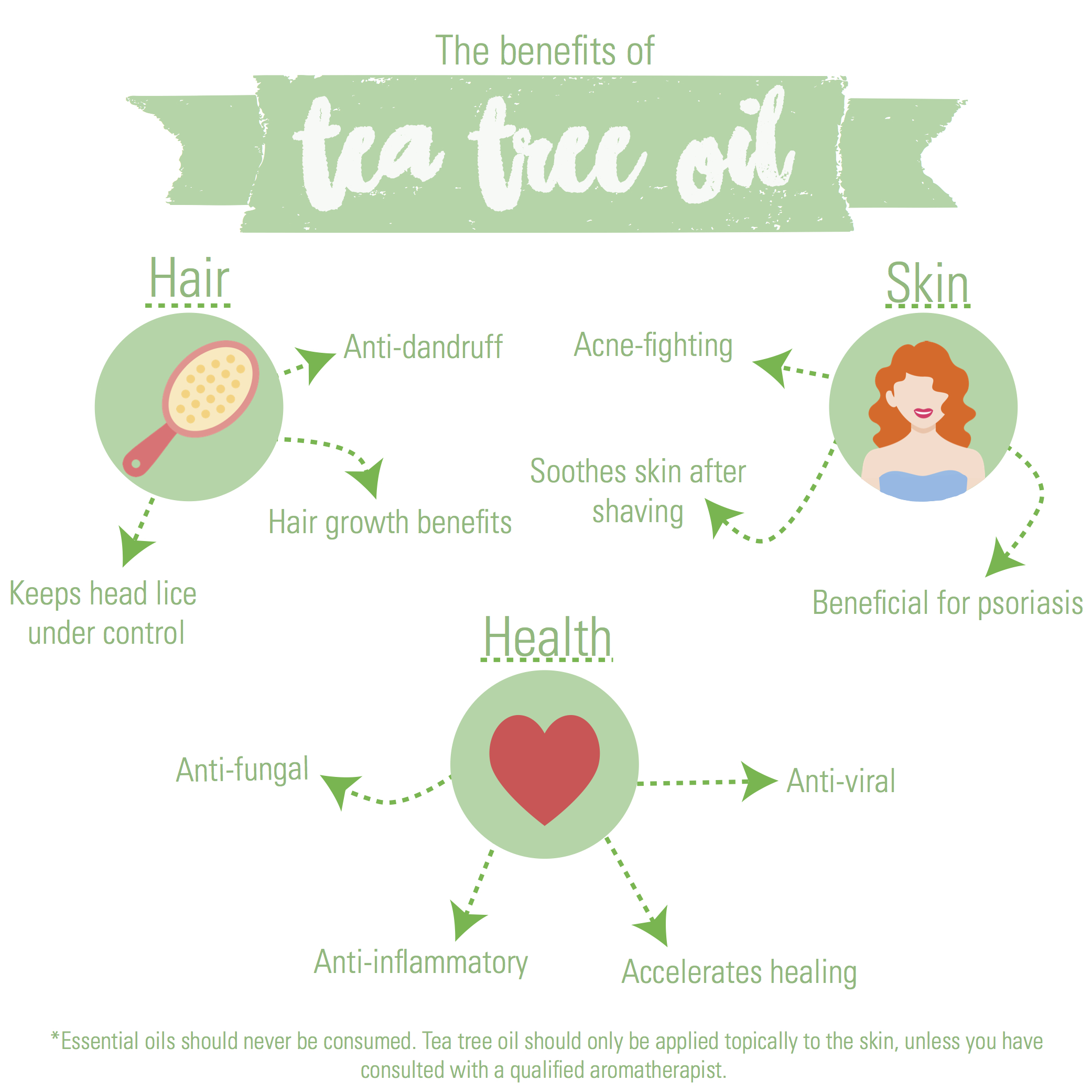Research about the benefits of tea tree essential oil is plentiful.
But since European Union regulation imposed a restriction on the amount of tea tree oil allowed in skin care products, some people have become concerned about sensitivity or allergies to tea tree oil. This article explains why tea tree oil allergies are rarer than statistics might show, how to do a proper patch test so you can find out for yourself, and how you can benefit from this incredible oil.
The Power of Tea Tree
Melaleuca alternifolia, or ‘tea tree’ originates from Australia and the native aborigines have used it for millennia. Essential oil of tea tree, which is also known as melaleuca oil, (the concentrated distilled extract of the leaves and twigs) is one of the most powerful substances and anti-microbial agents that nature has to offer.
In research, it has been shown to be effective against the hospital bug MRSA and useful in treating skin complaints from acne to psoriasis.
But with this power – the goodness of many tea tree leaves are distilled into just a few ml of tea tree essential oil - comes the need for caution.
With a very few exceptions, tea tree oil should never be used undiluted on the skin and under no circumstances should you ever swallow it.
Skin irritation from tea tree oil has only been documented at a high concentration [1], far above what is usually recommended with essential oils. However, there was also no indication in the study of the quality or grade of tea tree and evidence to suggest a bias was involved.

Why is that important?
Not all tea tree oil is made equal.
A tea tree grower in New South Wales once told us a peculiarity of tea tree in that it often grows wild with other plants that can be irritating to the skin. The best tea tree is thus carefully harvested to avoid any contamination with extra vegetation surrounding the leaves.
Similarly, organic tea tree oil is likely to be safer than tea tree that could be contaminated with vegetation that has been sprayed with weedkiller: an essential oil is very concentrated, so if it is non-organic, any synthetic herbicides or pesticides used could also be present in the essential oil and these do have the potential to irritate. [2]
Am I Allergic To Tea Tree Oil?
Of course anyone can be allergic to anything, so if you suspect you’re allergic to tea tree, it’s worth having a patch test done.
The only snag is that patch-testing is often done using a blend of ingredients or a fragrance oil rather than pure tea tree (as well as poor quality tea tree as per above). This means that the other components in the mixture could be causing the allergic reaction (such as synthetic fragrance).
So if allergy symptoms flag up, it could be a red herring. If you do decide to go for an allergy test, enquire about what exactly they are using. Ask the following questions:
Is this solely pure tea tree oil?
Is the oil organic?
If the answer is ‘no’, the good news is, is that you can undertake your very own allergy test at home.
How To Do An At-Home Allergy Test
1) Buy some pure, organic tea tree essential oil.
2) Dispense 1-2 drops onto your fingertips and dab onto the inside of your forearm. Allow to dry before covering with any clothing.
3) If you experience any irritation or burning, wash off gently, rinse with cool water and pat dry.
4) If there is no sign of redness or irritation after 24 hours, wash off as normal. Tea tree and you are fully compatible and you can enjoy all its wonderful benefits.
*Don't despair if you did react, you may still be able to use tea tree in diluted form. Wait at least a week for your immune system to switch off and try again, this time with 1 drop of tea tree essential oil mixed in 1 tsp of olive oil or other culinary oil of your choice. Proceed as before. If all goes well, you should be fine to use tea tree in diluted form in a product such as Odylique Spot-On-Serum or Tea Tree and Herb shampoo.
How To Dilute Tea Tree Oil
Unlike the majority of essential oils, tea tree oil doesn't necessarily need to be diluted and can be used neat. You should note though, that you should only use a few drops at a time - essential oils are powerful substances and should be handled with care!
In our opinion, if used properly, tea tree oil is quite brilliant. But don’t take our word for it, have a look at all the research on tea tree oil benefits here and people's real life stories of using essential oils.
Some of the potential health benefits of tea tree oil (according to the research referenced) include:
1) Bug-busting disinfectant [3][4]
2) Antiviral [6]
3) Anti-inflammatory [7]
4) Accelerates wound healing [10]
5) Home antiseptic
As you can see, there are a myriad of benefits to be enjoyed by incorporating tea tree oil into your life. Not only does it have its very practical uses in the home (it can be diffused and used as an air purifier) but it also works wonders in a beauty regimen for skin and hair.
Disclaimer: due to FDA regulation we aren't allowed to claim theraputic/healing benefits of tea tree oil, however, when you read the research and anecdotes for yourself, you can come to your own conclusion!6) It can be soothing on skin and used after hair removal. Add a couple of drops into your moisturiser or add a few drops of tea tree oil to bath water.
7) It is an acne fighter! [11][12] Tea tree oil is a great addition to your skincare routine if you suffer from acne, especially as it is antimicrobial. Using tea tree oil for acne is straight forward - it can be used neat or diluted as an on-the-spot treatment.
8) Beneficial in the treatment of psoriasis. [14]
9) Tea tree is useful against fungal infections, such as dandruff. [5]
10) Anti-dandruff [13],
11) Anecdotal evidence suggests hair-growth benefits.
12) Keeps head lice under control! As a preventative measure, or if you currently have head lice, we would recommend using tea tree shampoo. One study found that a 1% tea tree oil solution killed 100% of head lice in 30 minutes! [15]
If you are interested in testing out the hair benefits of tea tree, try our all natural tea tree shampoo and let us know the results!
We would like to note that essential oils should never be ingested! Tea tree oil is for topical application only.
If you'd like any more advice, please do email us – info@odylique.com, add your question as a comment below, or call 06175008271 – we're here to help!
References
[1]K.A. Hammer, C.F. Carson, T.V. Riley, J.B. Nielsen, ‘A review of the toxicity of Melaleuca alternifolia (tea tree) oil’ Food and Chemical Toxicology, Volume 44, Issue 5, May 2006, Pages 616–625. [2] Natalí Bernardi, Natalia Gentile, Fernando Mañas, Álvaro Méndez, Nora Gorla, Delia Aiassa, ‘Assessment of the level of damage to the genetic material of children exposed to pesticides in the province of Córdoba.’, Arch Argent Pediatr. 2015 Apr ;113(2):126-31. PMID: 25727816, Mar 31, 2015
[3] M S Dryden, S Dailly, M Crouch, ‘A randomized, controlled trial of tea tree topical preparations versus a standard topical regimen for the clearance of MRSA colonization.’ J Hosp Infect. 2004 Apr;56(4):283-6. PMID: 15066738, Apr 01, 2004. [4] J Karbach, S Ebenezer, P H Warnke, E Behrens, B Al-Nawas, ‘Antimicrobial effect of Australian antibacterial essential oils as alternative to common antiseptic solutions against clinically relevant oral pathogens.’, Clin Lab. 2015 ;61(1-2):61-8. PMID: 25807639, Dec 31, 2014
[5] D S Buck, D M Nidorf, J G Addino, ‘Comparison of two topical preparations for the treatment of onychomycosis: Melaleuca alternifolia (tea tree) oil and clotrimazole.’, J Fam Pract. 1994 Jun;38(6):601-5. PMID: 8195735, Jun 01, 1994 [6] P Schnitzler, K Schön, J Reichling, ‘Antiviral activity of Australian tea tree oil and eucalyptus oil against herpes simplex virus in cell culture.‘, Pharmazie. 2001 Apr;56(4):343-7. PMID: 11338678, Apr 01, 2001.
[7] Nader Pazyar, Reza Yaghoobi, ‘Tea tree oil as a novel antipsoriasis weapon.’, Skin Pharmacol Physiol. 2012 ;25(3):162-3. Epub 2012 Apr 3. PMID: 22473218, Dec 31, 2011 [10] Pazyar, N., Yaghoobi, R., Bagherani, N. and Kazerouni, A. (2013), A review of applications of tea tree oil in dermatology. Int J Dermatol, 52: 784–790. doi:10.1111/j.1365-4632.2012.05654.
[11] Khalifa E Sharquie, Ihsan A Al-Turfi, Wathik M Al-Shimary, ‘Treatment of acne vulgaris with 2% topical tea lotion’, Saudi Med J. 2006 Jan;27(1):83-5. PMID: 16432600, Jan 01, 2006.
n.’, Med J Aust. 1990 Oct 15;153(8):455-8. PMID: 2145499, Oct 15, 1990. [13] Satchell AC, Saurajen A, Bell C, Barnetson RS, ‘Treatment of dandruff with 5% tea tree oil shampoo.’, J Am Acad Dermatol. 2002 Dec;47(6):852-5.,
[14] Nader Pazyar, Reza Yaghoobi, 'Tea tree oil as a novel antipsoriasis weapon.', Skin Pharmacol Physiol. 2012 ;25(3):162-3. Epub 2012 Apr 3. PMID: 22473218, Dec 31, 2011
[15] Mills C, Cleary BJ, Gilmer JF, Walsh JJ. Inhibition of acetylcholinesterase by tea tree oil. J Pharm Pharmacol. 2004;56:375-379. Icons made by Freepikfrom www.flaticon.comis licensed by CC 3.0 BY
We cannot claim that essential oils have medicinal benefits under FDA regulation.

